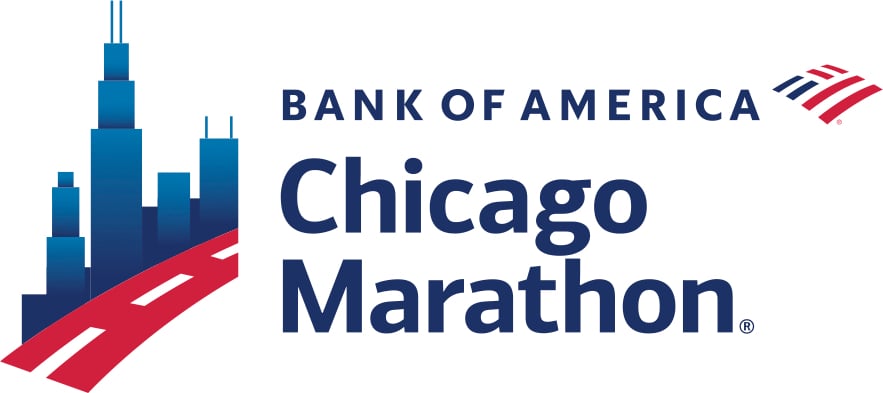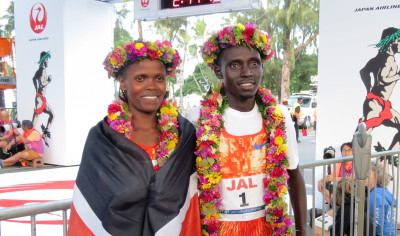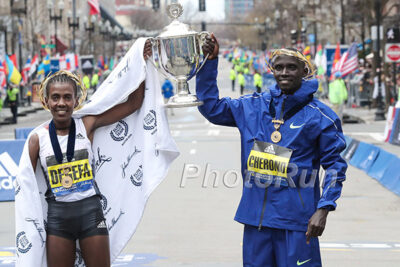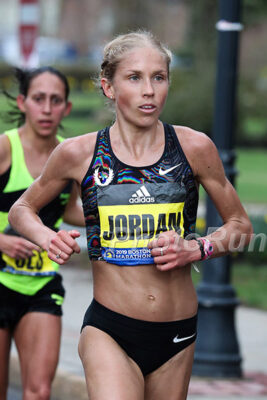2019 Chicago Marathon Elite Field Analysis: An Extremely Shallow Women’s Race, But The Men’s Race Could Be Epic
By Jonathan Gault
August 28, 2019
The 2019 Bank of America Chicago Marathon announced its international elite fields on Wednesday, and there’s good news and bad news for marathon fans.
First, the good: the men’s race on October 13 should be incredible. In addition to the previously-announced Galen Rupp and Mo Farah, who have combined to win the past two editions of the race, Chicago is also bringing in Boston Marathon champ Lawrence Cherono of Kenya, 2:03 man Herpasa Negasa of Ethiopia, and Ethiopian Getaneh Molla, who ran the fastest debut marathon ever, 2:03:34, to break the course record in Dubai in January. Throw in 2015 Chicago champ Dickson Chumba, who has three wins and nine top-three finishes in 11 Abbott World Marathon Majors events, Tokyo runner-up Bedan Karoki, and Kenneth Kipkemoi, who was a close third in Boston this year, and it’s a terrific field. In fact, with Eliud Kipchoge skipping his annual trip to Berlin in favor of the INEOS 1:59 Challenge, and a relatively shallow field in New York, Chicago is the premier men’s race of the fall 2019 marathon season.
The bad: the women’s field is one of the weakest ever assembled at a World Marathon Major. There are only two Kenyans entered — and no Ethiopians — and while that’s not the only measure of quality, the personal bests in this field won’t blow anyone away. Chicago did a great job by bringing back returning champion Brigid Kosgei, who is the top female marathoner in the world right now after wins in Chicago and London. But Jordan Hasay is the only other woman in the field who has run faster than 2:22:56 — and one of only four women in the field to have broken 2:25.
More bad news: top Americans Amy Cragg, Chris Derrick, and Brogan Austin have all withdrawn from the race. Obviously this isn’t a great sign for any of the three, with the Olympic Trials just six months away, but it’s particularly distressing for Cragg, 35, who hasn’t run a marathon since February 2018. Cragg was entered in Chicago last year but withdrew after a hamstring injury put her behind schedule. Her main race this spring, the Prague Half Marathon, went poorly (she ran 73:27, exactly five minutes off her PR), and though no reason was given for her withdrawal from Chicago, she may have been discouraged by her most recent race at the Beach to Beacon 10K on August 3, where she could only manage 34:40 for 14th place.
Cragg did put out this statement on social media saying she needs more time to get ready to defend her Olympic Trials title.
It breaks my heart but unfortunately, I am going to have to withdrawal from the Bank of America Chicago Marathon. As I got into training signs pointed towards needing more time after last years injury in order to put my best foot forward for the… https://t.co/LvetmS8GaU
— Amy Hastings Cragg (@HastyHastings) August 28, 2019
Derrick, who was 10th at the NYC Marathon last year, withdrew after he stepped in a pothole and fractured his fibula at the Crim 10-Miler last weekend. Austin, the 2018 US marathon champion, has been battling plantar fasciitis for months.
The full international elite fields are below. Previously-announced US elite fields can be found here.
2019 Bank of America Chicago Marathon international men’s elite field
| Name Getaneh Molla Herpasa Negasa Lawrence Cherono Dickson Chumba Hassan El Abbassi Mo Farah Kenneth Kipkemoi Bedan Karoki Minato Oishi Shoya Osaki Ryoma Takeuchi Yuta Takahashi Tsubasa Hayakawa Joel Tobin-White Emmanuel Roudolff-Lévisse |
Country ETH ETH KEN KEN BRN GBR KEN KEN JPN JPN JPN JPN JPN AUS FRA |
Personal best 2:03:34 2:03:40 2:04:06 2:04:32 2:04:43 2:05:11 2:05:44 2:06:48 2:10:39 2:10:48 2:11:20 2:11:25 2:12:01 Debut Debut |
2019 Bank of America Chicago Marathon international women’s elite field
| Name Brigid Kosgei Betsy Saina Madai Perez Lisa Weightman Fionnuala McCormack Jovana de la Cruz Natasha LaBeaud Chirine Njeim Anke Esser Alice Wright |
Country KEN KEN MEX AUS IRL PER CAN LBN GER GBR |
Personal best 2:18:20 2:22:56 2:22:59 2:25:15 2:30:38 2:31:33 2:35:33 2:39:21 2:43:14 Debut |
Let’s dive a little deeper into the fields with some analysis.
1) The men’s race is going to be fantastic
Before today, there were already plenty of juicy men’s storylines in Chicago. How does Galen Rupp do in his return following foot surgery? Will Mo Farah try to run the 10,000 at the World Championships on October 6 before tackling Chicago a week later? Does 36-year-old Dathan Ritzenhein have anything left in the tank?
Now add in the cadre of studs Chicago announced this morning, and this will be one of the most hotly-anticipated races of the year. You’ve got the reigning champs in Chicago (Farah) and Boston (Cherono), as well as Getaneh Molla, one of the most intriguing prospects in the sport after his debut record of 2:03:34 in Dubai. Last year’s race was one of the most competitive of 2018, with six men breaking 2:07, and 2019 Chicago could be even better.
2) The women’s race is very weak despite having top women’s marathoner in the world
Below is a chart of the women’s entries in every World Marathon Major elite field since the start of 2017 (minus this year’s Berlin Marathon, as they have not yet published their full field). 2019 Chicago is tied for the fewest entrants to have broken 2:22 (two) and 2:24 (four).
| Race | Sub-2:19 | Sub-2:20 | Sub-2:21 | Sub-2:22 | Sub-2:23 | Sub-2:24 |
| 2019 NYC | 3 | 3 | 3 | 3 | 5 | 5 |
| 2019 Chicago | 1 | 1 | 2 | 2 | 4 | 4 |
| 2019 London | 5 | 7 | 8 | 9 | 9 | 10 |
| 2019 Boston | 0 | 4 | 6 | 7 | 11 | 12 |
| 2019 Tokyo | 1 | 4 | 5 | 6 | 9 | 11 |
| 2018 NYC | 2 | 2 | 2 | 4 | 5 | 6 |
| 2018 Chicago | 0 | 3 | 5 | 5 | 5 | 5 |
| 2018 Berlin | 1 | 4 | 5 | 5 | 6 | 8 |
| 2018 Boston | 0 | 3 | 4 | 7 | 8 | 9 |
| 2018 London | 2 | 4 | 5 | 7 | 8 | 9 |
| 2018 Tokyo | 0 | 0 | 3 | 5 | 5 | 5 |
| 2017 NYC | 1 | 3 | 3 | 5 | 5 | 5 |
| 2017 Chicago | 1 | 2 | 2 | 2 | 3 | 5 |
| 2017 Berlin | 0 | 1 | 2 | 3 | 3 | 5 |
| 2017 Boston | 0 | 3 | 3 | 3 | 6 | 7 |
| 2017 London | 1 | 4 | 6 | 8 | 8 | 8 |
| 2017 Tokyo | 0 | 0 | 1 | 2 | 3 | 3 |
But even those stats are a little misleading. Kosgei, who is coming off a 2:18:20 pb in London, is obviously in outstanding form. And Hasay, who ran 2:20:57 in Chicago two years ago and just finished third in Boston, is in great shape too. But the two other sub-2:24 performers are hardly consistent. Kenya’s Betsy Saina DNF’d her first two marathons before winning 2018 Paris in 2:22:56. Since then, she’s run 2:24:35 for 8th in Frankfurt and 2:30:32 for 10th in Boston. Meanwhile, Mexico’s Madai Perez is 39 years old and her PR dates all the way back to 2006. Since running 2:22:59 in Chicago that year, she has come within four minutes of that time only once (2:24:44 in Chicago in 2017). She ran just 2:30:04 in her most recent marathon in Hamburg in April.
Australia’s Lisa Weightman has run 2:25:15, and she just ran a 68:48 half marathon PR on August 4, so she’s fit. But after her, no one else in this field has even broken 2:28.
Of course, this helps the Americans’ chances. Kosgei has been unbeatable recently, but if she picks up an injury between now and October 13 or something goes wrong in the race, Hasay, who said she is targeting Deena Kastor‘s 2:19:36 American record in Chicago, would become the clear favorite. Behind Hasay, Americans like Emma Bates (2:28:19) and Stephanie Bruce (2:29:20 pb) will be dreaming of the podium.
But it’s important to keep these accomplishments in perspective. If Hasay wins and beats Kosgei to do it, by all means celebrate it as a breakthrough for American distance running. But if Kosgei scratches and Hasay only wins because she’s facing a watered-down elite field, that victory should carry an asterisk.
3) Why isn’t the women’s field better?
There are a few reasons. For one, the men’s field is stacked, and a few of those guys (Farah and Rupp in particular) likely commanded huge appearance fees. And on the women’s side, Chicago shelled out for the top marathoner in the world (Kosgei) and the top American running a fall marathon (Hasay). That doesn’t leave a lot left over to fill out the women’s field. Chicago caught a bad break with Cragg, one of their top draws, pulling out of the race.
Chicago also has to recruit against not just the other fall majors, but the World Championships marathon. The last time Worlds were held, in 2017, the Chicago women’s field was similarly shallow. Still, there are definitely a few mid-2:20s women out there with potential who would show up in Chicago for not much more than the cost of a plane ticket and a hotel room and could provide some much-needed depth.
American pro Stephanie Bruce suggested another potential reason:
You could say it’s not strong. Or you could said it’s fair because the World Marathon Majors is committed to clean sport and maybe they are tired of their defending champs (Jeptoo, Shobukhova) testing positive so they are selective of who they invite now. Just a thought??♀️ https://t.co/LxyQQh61o9
— Stephanie Bruce (@Steph_Rothstein) August 28, 2019
The World Marathon Majors have been leading the fight against doping in the marathon, and, as Bruce points out, they have been burned in the past by athletes such as Rita Jeptoo, Jemima Sumgong, and Liliya Shobukhova.
4) Where does Amy Cragg go from here?
When LetsRun.com spoke to Cragg just a month ago, she seemed fairly optimistic and ready to get after things in Chicago. She also said that she felt it was important to run a marathon before the Trials, even though she no longer needs to knock out the Olympic standard beforehand.
“Going into the Olympic Trials, I want to have another hard one under my belt,” Cragg said at the time. “I want to feel the training again. I think your body really adapts to high mileage. And since it’s been so long since I’ve even done that, I want to make sure that my body is adapted going into the training for the Trials.”
Clearly, Cragg decided she need to change her focus to the Trials, which is the race she’s been zeroed in on since last year. But it’s not clear which version of Cragg we’ll see; should she make it to the start line in Atlanta, she’ll be 36 years old and over two years removed from her last marathon.
Cragg’s withdrawal from Chicago also throws more intrigue into what was already an intriguing women’s race at the Trials. When LetsRun.com projected the 2020 Olympic team last summer, it seemed obvious that the women’s marathon squad would consist of three of the following five women: Hasay, Cragg, Shalane Flanagan, Molly Huddle and Des Linden. But over the past 12 months, the picture has grown considerably foggier. Flanagan underwent knee surgery in April; she seems determined to return to racing but has not announced whether she will run the Trials. Cragg hasn’t run a marathon since February 2018. Huddle only managed 2:26 in London and has yet to have her big breakthrough race. Meanwhile, Emily Sisson went out and ran 2:23 in her debut in London and Kellyn Taylor has looked impressive, pushing Sisson to the line in the 10,000 at USAs in July.
Hasay, assuming she stays healthy, is the closest thing to a lock on the team right now, but little is certain. Which makes for an exciting fall marathon season and a Trials that carries one of the best descriptions a sporting event can have: unpredictable.
Editor’s note: This article originally said Derrick suffered an injury at the Beach to Beacon 10K. The injury actually occurred at the Crim 10-Miler.




